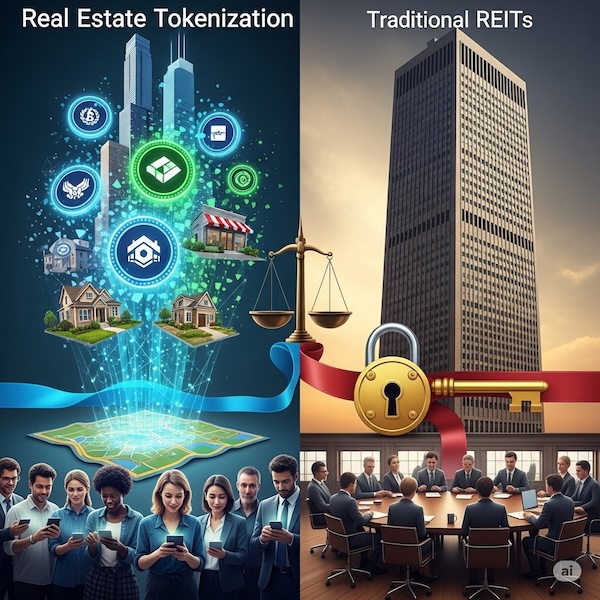The institutional investment landscape is experiencing a seismic shift that will fundamentally reshape how we think about real estate as an asset class. What was once considered experimental technology relegated to the fringes of finance is now becoming a cornerstone of sophisticated investment strategies employed by the world's largest and most conservative financial institutions.
Tokenized real estate, in particular, has captured the attention of pension funds, insurance companies, family offices, sovereign wealth funds, and endowments worldwide. These institutions, which collectively manage trillions of dollars in assets, are beginning to recognize that tokenization represents not just a technological innovation, but a fundamental evolution in how real estate can be owned, traded, and managed.
The Institutional Awakening
For years, institutional investors watched from the sidelines as blockchain technology matured and evolved. The extreme volatility of cryptocurrencies, regulatory uncertainty, and concerns about security and custody kept many traditional institutions at bay. The prevailing sentiment was one of cautious observation rather than active participation.
However, the emergence of asset tokenization—particularly in real estate—has provided a bridge between traditional finance and digital innovation that institutions can finally embrace with confidence. Unlike speculative cryptocurrencies, tokenized real estate represents ownership in tangible, income-producing assets with established valuation methodologies and proven track records.
Recent data shows that institutional investment in tokenized assets has grown by over 400% in the past two years, with real estate representing the largest segment of this growth. This isn't just about following trends or checking boxes for innovation; it's about recognizing fundamental advantages that tokenization brings to institutional portfolios that simply cannot be achieved through traditional investment structures.
Why Institutions Are Making the Move
Enhanced Liquidity Management
Traditional real estate investments have always posed significant liquidity challenges for institutional investors. A pension fund might need to hold an illiquid commercial property for decades, limiting their ability to rebalance portfolios, respond to changing market conditions, or meet unexpected liquidity needs. This illiquidity has historically been one of the primary barriers to larger real estate allocations among institutional investors.
Tokenized real estate changes this dynamic entirely. Through tokenization, institutions can maintain exposure to high-quality real estate while gaining the flexibility to adjust positions as needed. Secondary markets for tokenized assets provide liquidity options that simply don't exist in traditional real estate investment, allowing institutions to be more dynamic and responsive in their asset allocation strategies.
Improved Diversification Opportunities
Tokenization enables institutional investors to achieve levels of diversification that were previously impossible or prohibitively expensive. Instead of being limited to large, expensive properties in their local markets, institutions can now participate in fractional ownership in premium properties across multiple geographic markets, property types, and investment strategies.
A regional pension fund that might have been limited to investing in office buildings and retail centers in their home state can now participate in luxury residential developments in major metropolitan areas, industrial properties in emerging markets, and specialized real estate sectors like data centers or life sciences facilities.
Operational Efficiency and Cost Reduction
Traditional real estate investment involves significant operational overhead, from property management and maintenance to legal and administrative costs. For institutional investors, these operational requirements often necessitate building large internal real estate teams or paying substantial fees to external managers.
Tokenized real estate platforms handle much of this operational complexity through technology and professional management, allowing institutions to gain real estate exposure without the associated operational burden. Smart contracts automate many administrative functions, from rent collection and distribution to compliance monitoring and reporting.
Enhanced Transparency and Reporting
Institutional investors are subject to increasingly stringent reporting and transparency requirements from regulators, beneficiaries, and stakeholders. Traditional real estate investments often provide limited visibility into property-level performance, with reporting that may be quarterly or even annual.
Blockchain-based tokenized real estate provides unprecedented transparency and real-time reporting capabilities. Every transaction, distribution, and performance metric is recorded on the blockchain, creating an immutable audit trail that satisfies even the most demanding compliance requirements.
The Future of Institutional Investment
As more institutional capital flows into tokenized real estate, we can expect to see significant market development and maturation. Increased institutional participation will likely lead to improved liquidity, more sophisticated pricing mechanisms, and the development of additional institutional-grade services and infrastructure.
The scale of potential institutional investment in tokenized real estate is enormous. If institutions allocate even a small percentage of their traditional real estate allocations to tokenized alternatives, it could represent hundreds of billions of dollars in new capital flowing into the space.
Conclusion
The rise of institutional investment in tokenized real estate represents more than just a new investment trend—it's a fundamental evolution in how we think about real estate as an asset class. As institutions continue to embrace this technology, we can expect to see increased market depth, improved price discovery, and greater accessibility to high-quality real estate investments for all types of investors.
The future of real estate investment is being written today, and institutional investors are playing a leading role in that story.



